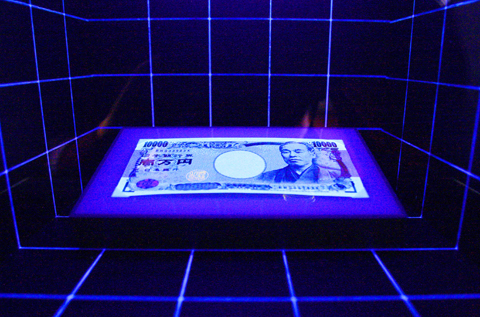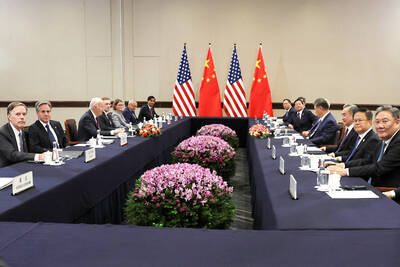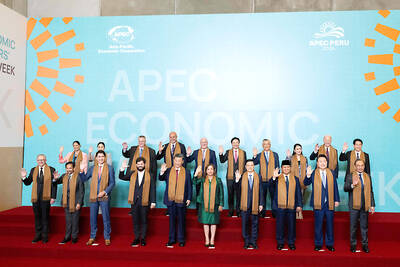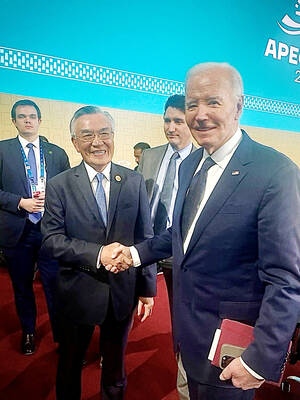The Bank of Japan (BOJ) stepped closer to currency intervention yesterday than at any time in the last five years by checking exchange rates with commercial banks as the yen rallied to a 14-year high against the dollar.
Still, market sources said intervention was highly unlikely in the short term and that authorities were instead aiming to temper the sentiment driving the yen higher.
While the central bank made its presence known in the market, Japanese Finance Minister Hirohisa Fujii raised the prospect of a G7 joint statement on currencies to cool the yen’s rally.

PHOTO: REUTERS
The dollar slumped to a low of ¥84.82 as investors shunned riskier assets after news about Dubai’s debt problems, but it pared its losses after Fujii’s comments because his rhetoric was sharper than it had been on Thursday.
G7 countries issued a statement in October last year when the yen rallied against other major currencies, so traders and analysts said a joint statement was possible.
But joint intervention was extremely unlikely, they said. Such action might send the wrong signal at a time when the G7 wants to encourage China to let the yuan rise by maintaining flexible currency markets.
Unilateral intervention by Japan was also unlikely because the yen’s rise is largely the result of the dollar’s broad weakness, and the BOJ would not have enough financial firepower to reverse the dollar’s decline.
The mere threat of joint action though was enough to curb the yen’s gains against the dollar, traders said.
“I would respond flexibly to a joint statement on currencies,” Fujii told reporters after a Cabinet meeting.
Fujii said he was also flexible about contacting currency authorities in the US and Europe, adding that he was very nervous about currency moves and it was possible Japan could respond.
He declined to comment on intervention, saying he was not in a position to use the word due to commitments with other G7 countries on currency flexibility.
Market sources said the government and the Bank of Japan had checked dollar-yen rates with commercial banks, going beyond their usual practice of market contact than at any time since authorities intervened earlier this decade to curb yen strength from harming exports.
That intervention came to a stop in March 2004 after authorities dumped ¥35 trillion over 15 months.
During that period, the finance ministry and the BOJ often checked rates as a prelude to intervention.
“The Bank of Japan may have wanted to make its presence felt,” a trader said of yesterday’s rate checking.
The dollar has been in a long-term decline. Against a basket of major currencies it hit a 15-month low on Thursday.
“I would not be surprised if the G7 or the Group of 20 issues a statement to prevent the dollar from weakening further, although it is unclear if they will act now or wait until a G7 meeting in February,” said Koji Fukaya, a senior currency strategist at Deutsche Securities in Tokyo. “But the statement would unlikely be the kind issued in October last year, because the current situation stems from a weak dollar.”
The yen has risen 5.3 percent since the end of last year. In trade-weighted terms, its rise is also modest with the currency well below highs hit in January.
“I have not heard of intervention at this point but in the future there will be various options and if necessary I’ll talk to ministers involved,” Japanese National Strategy Minister Naoto Kan told reporters.
The dollar’s decline against major currencies has been more pronounced, and traders say its slump against the yen is more a symptom of worries that low US interest rates are fostering economic bubbles and that chances of a Dubai debt default are reigniting financial turmoil.
“I can’t see what purpose dollar/yen intervention would serve,” said Hideki Amikura, executive director of foreign exchange services at Nomura Trust & Banking Co in Tokyo.

ONE LAST TALK: While Xi said that Taiwan was a ‘red line,’ Biden, in what is likely his last meeting with Xi as president, called for an end to China’s military activity around Taiwan China’s military intimidation and economic coercion against Taiwan are the main causes of tensions that are destabilizing peace in the Taiwan Strait, Taipei said yesterday while thanking US President Joe Biden for expressing Washington’s firm stance of maintaining peace and stability in the region. Biden and Chinese President Xi Jinping (習近平) met on Saturday for their third meeting and their first talks in seven months on the sidelines of the APEC forum in Lima, Peru. It was likely Biden’s last meeting as president with Xi. During their conversation, Biden reiterated the US’ opposition to any unilateral change to the “status quo” from either

Taiwan would participate in the 2026 APEC summit to be hosted by China after Beijing promised it would ensure the personal safety of attendees, Taiwanese national security sources said yesterday. The APEC Leaders’ Machu Picchu Declaration announced yesterday said that China would host the APEC summit in 2026. Beijing proposed hosting the summit shortly before this year’s gathering began on Friday, a national security official said, speaking on condition of anonymity. Many APEC members expressed concerns about China hosting the event and said that prior communication over the decision was insufficient, the official said. Taiwan brought up concerns about legal “guidelines” China announced in

SUPPORT: Arms sales to NATO Plus countries such as Japan, South Korea and Israel only have to be approved by the US Congress if they exceed US$25m The US should amend a law to add Taiwan to the list of “NATO Plus” allies and streamline future arms sales, a US commission said on Tuesday in its annual report to the US Congress. The recommendation was made in the annual report by the US-China Economic and Security Review Commission (USCC), which contained chapters on US-China economic and trade ties, security relations, and Taiwan and Hong Kong. In the chapter on Taiwan, the commission urged the US Congress to “amend the Arms Export Control Act of 1976 to include Taiwan on the list of ‘NATO Plus’ recipients,” referring to

MEET AND GREET: The White House, which called the interaction ‘just a handshake,’ did not immediately respond to a request for comment on whether Biden planned to visit Taiwan’s envoy to the APEC summit, Lin Hsin-i (林信義), on Friday invited US President Joe Biden to visit Taiwan. During the APEC Leaders’ Informal Dialogue, Lin, who represented President William Lai (賴清德) at the summit, spoke with Biden and expressed gratitude to the outgoing US president for his contribution to improving bilateral ties between Taipei and Washington over the past four years, the Ministry of Foreign Affairs said. Lin and Biden exchanged views during the conversation, with Lin extending an invitation to Biden to visit Taiwan, it said. Biden is to step down in January next year, when US president-elect Donald Trump is